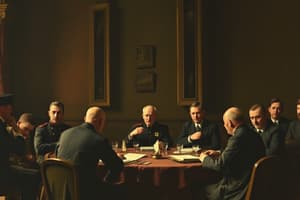Podcast
Questions and Answers
What was one of the main reasons for holding the Paris Peace Conference in a neutral country?
What was one of the main reasons for holding the Paris Peace Conference in a neutral country?
- To allow secret negotiations with the victors
- To prevent one country from dominating the discussions (correct)
- To ensure all countries were financially supported
- To appease Germany before the negotiations started
Which of the following was NOT a consequence of the Treaty of Versailles for Germany?
Which of the following was NOT a consequence of the Treaty of Versailles for Germany?
- Loss of the ability to establish new alliances
- Reestablishment of the German Empire (correct)
- Ceding of 13% of its territory
- Reduction of the army to 100,000 troops
What was one significant impact of World War I on the political landscape of Europe?
What was one significant impact of World War I on the political landscape of Europe?
- The unification of all European countries
- A decrease in U.S. global influence
- The emergence of new nation-states (correct)
- The strengthening of the Ottoman Empire
Which of the following technologies was NOT developed during World War I?
Which of the following technologies was NOT developed during World War I?
What was one of the main purposes of the League of Nations formed after WWI?
What was one of the main purposes of the League of Nations formed after WWI?
Flashcards
Paris Peace Conference
Paris Peace Conference
International meeting held in Paris after WWI to establish peace terms.
WWI Casualties
WWI Casualties
Over 8 million deaths and 20 million injuries during WWI.
Treaty of Versailles - Military Restrictions
Treaty of Versailles - Military Restrictions
Germany's army was limited, and the country couldn't possess certain weapons after the war.
War Guilt Clause
War Guilt Clause
Signup and view all the flashcards
League of Nations
League of Nations
Signup and view all the flashcards
Study Notes
The Paris Peace Conference
- The Paris Peace Conference followed World War I, with a desire for peace but also various self-interests among involved nations.
- Countries were in ruins and wanted peace, but also wanted to punish the losing nations for the war.
- Nations, particularly France, wanted revenge for damages caused by Germany.
- The conference was held in France's capital, Paris.
- An allied/central/neutral country was chosen as the location for the conference.
- The victors in the war were more focused on holding Germany accountable and ensuring their defeat.
- Germany was not invited to participate until the very end of the conference, when they were forced to sign the Treaty of Versailles.
- The victorious nations didn't openly negotiate with the defeated nations, but instead used secretive or private processes.
Treaty of Versailles
- Germany's military was drastically reduced (100,000 soldiers).
- Germany was forbidden from having tanks, submarines, and fighter planes.
- Germany was required to pay substantial reparations (6.6 billion pounds over 42 years).
- Germany lost significant territories to neighboring countries.
- The Rhineland was established as a buffer zone.
- Germany and Austria were forbidden from uniting.
- Germany had to accept sole responsibility for starting the war (War Guilt Clause).
Impact of World War I
- Millions of deaths and injuries.
- Significant economic costs (estimated at $330 billion).
- Decline of powerful empires (Russian, Ottoman, German).
- Emergence of new nation-states.
- Development of new war technologies (poison gas, machine guns, tanks, submarines, and warplanes) altered warfare for future conflicts.
- Increased role of women.
- Formation of the League of Nations.
Studying That Suits You
Use AI to generate personalized quizzes and flashcards to suit your learning preferences.




